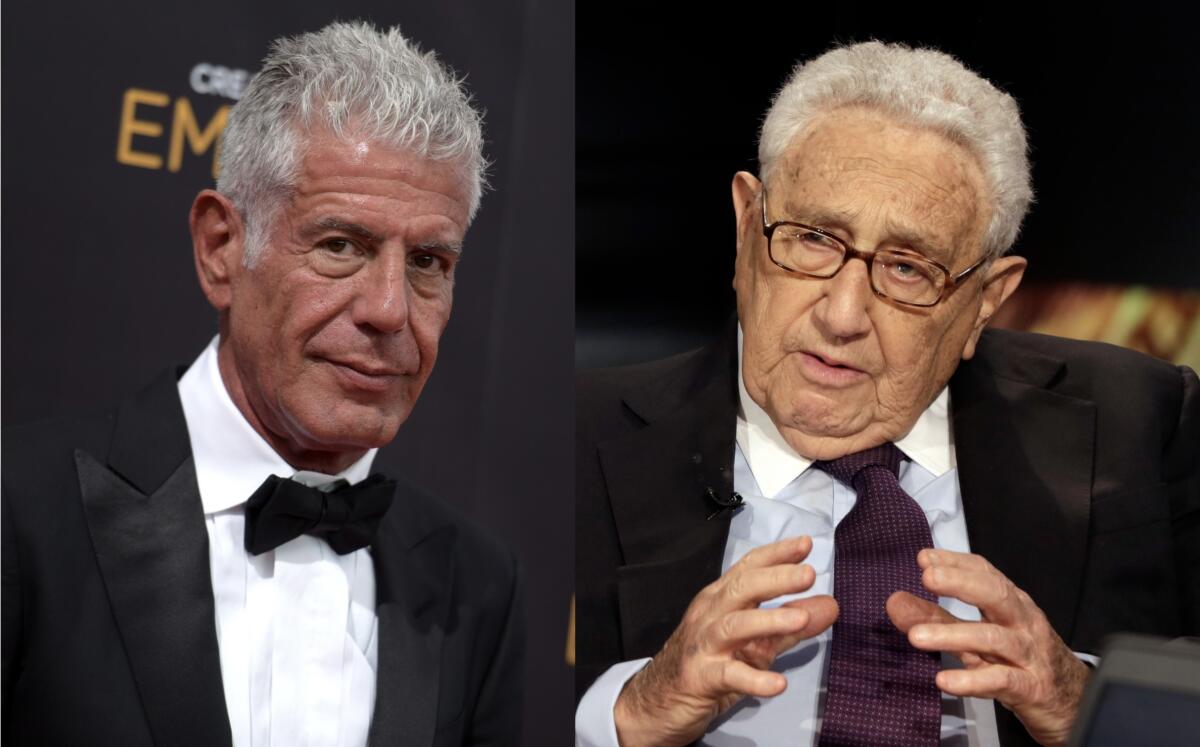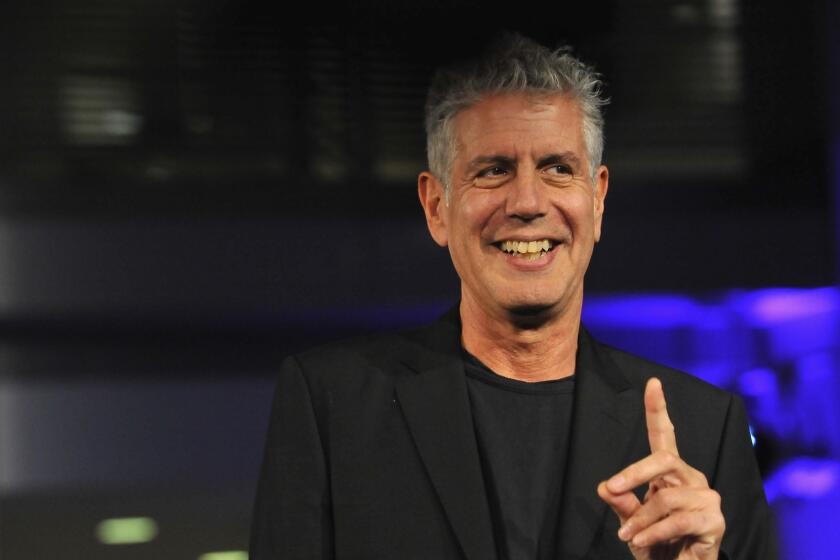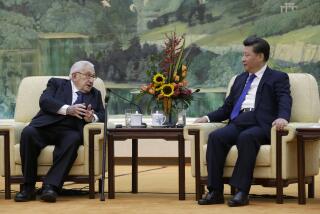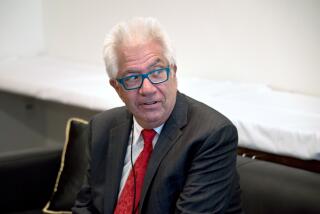Anthony Bourdain’s scathing Henry Kissinger remarks resurface after foreign policy figure’s death

- Share via
Anthony Bourdain didn’t mince words when it came to Henry Kissinger.
“Henry Kissinger walks into a bar. Would it displease you if I walked over and punched Henry Kissinger in the face?” Bourdain once asked guests appearing on an episode of his “Parts Unknown” TV program.
The late chef’s scathing remarks about the foreign policy figure have resurfaced in the wake of Kissinger’s death, and they’re being shared far and wide across the internet. Kissinger died Wednesday; he was 100.
Bourdain traveled to more than 80 countries over the course of his career as a celebrity chef and worldly television personality. He spent time in Southeast Asia, including in Vietnam, Cambodia and Laos, and his shows dived deep into the culture and geopolitics that defined a place’s past and present. In these countries, he illuminated the dark legacy of the Vietnam War.
In Bourdain’s 2001 memoir, “A Cook’s Tour: Global Adventures in Extreme Cuisines,” he wrote, “Once you’ve been to Cambodia, you’ll never stop wanting to beat Henry Kissinger to death with your bare hands. You will never again be able to open a newspaper and read about that treacherous, prevaricating, murderous scumbag sitting down for a nice chat with Charlie Rose or attending some black-tie affair for a new glossy magazine without choking. Witness what Henry did in Cambodia — the fruits of his genius for statesmanship — and you will never understand why he’s not sitting in the dock at The Hague next to Milosevic,” a reference to Slobodan Milosevic, the former Yugoslav and Serbian leader who was on trial for war crimes when he died in prison in 2006.
In 2018, he retweeted the passage, writing, “Frequently, I’ve come to regret things I’ve said. This, from 2001, is not one of those times.”
The former secretary of State, the architect of U.S. foreign policy at the apex of the Cold War and a towering force in world affairs, dies at 100 at his Connecticut home.
As national security advisor and secretary of State in the Nixon and Ford administrations, Kissinger dominated international relations from 1969 to 1977. He was always a controversial figure, and his most outspoken critics — Bourdain among them — saw him as ruthless and accused him of war crimes, mainly for the expansion of the Vietnam War into Cambodia and the support Washington gave to brutal right-wing dictatorships in Chile and Argentina.
As the architect of U.S. Cold War policy, Kissinger had a crowded agenda, much of it consumed by the Vietnam War. He and North Vietnamese negotiator Le Duc Tho were jointly awarded the Nobel Peace Prize for working out a plan intended to end the war, but the 1973 agreement failed to stop the fighting and the war dragged on for more than two more years until Saigon finally fell.
Kissinger accepted the honor but no-showed the ceremony, blaming the pressure of official duties. Tho refused the prize, explaining that he considered the negotiations to have been a failure.
In a 2017 profile in the New Yorker, Bourdain discounted the notion that his show’s focus on social and political issues had made him a statesmen of sorts.
“I’m not going to the White House correspondents’ dinner,” he quipped in response. “I don’t need to be laughing it up with Henry Kissinger.” According to the New Yorker, Bourdain then flew off the handle about how he was disgusted, having traveled in Southeast Asia, to see Kissinger embraced by the “power-lunch crowd.”
For all his gastronomic globe-trotting, Anthony Bourdain remained, in his words, “a man of simple needs.”
“Any journalist who has ever been polite to Henry Kissinger, you know, f— that person,” he told the outlet, who noted that he grew increasingly indignant. “I’m a big believer in moral gray areas, but when it comes to that guy, in my view he should not be able to eat at a restaurant in New York.”
The article pointed out that Bourdain had made “similarly categorical denunciations of many people, only to bury the hatchet and join them for dinner.”
Bourdain replied: “Emeril didn’t bomb Cambodia!”
Former Times staff writer Norman Kempster contributed to this report.
More to Read
The biggest entertainment stories
Get our big stories about Hollywood, film, television, music, arts, culture and more right in your inbox as soon as they publish.
You may occasionally receive promotional content from the Los Angeles Times.













